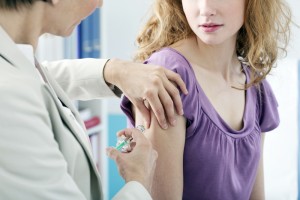 At the 29th Annual Meeting & Associated Programs of the Society for Immunotherapy of Cancer held November 6-9, a representative from Generex Biotechnology Corporation presented data detailing proof of concept for the company’s AE37 cancer vaccine developed by subsidiary Antigen Express, Inc. The vaccine induces an antibody response to HER2, the target of AE37, and reduces relapse in breast cancer patients.
At the 29th Annual Meeting & Associated Programs of the Society for Immunotherapy of Cancer held November 6-9, a representative from Generex Biotechnology Corporation presented data detailing proof of concept for the company’s AE37 cancer vaccine developed by subsidiary Antigen Express, Inc. The vaccine induces an antibody response to HER2, the target of AE37, and reduces relapse in breast cancer patients.
The presentation, “Correlation of HER2/neu Antibody Response to Clinical Response in a Phase II Trial of the AE37+GM-CSF HER2 Peptide Vaccine,” demonstrated that antibody response, not necessarily absolute levels of HER2-specific antibody, allowed relapse in enrolled patients. According to a news release from the company, this is the first study to characterize HER2-specific antibody response induced by the AE37 vaccine.
The AE37 peptide vaccine specifically activates HER2-specific CD4+ T-cells, a cell type important to both cell-mediated and antibody-mediated immune responses. These cells in turn recognize the HER2 protein, which is expressed on HER2-positive breast tumors, as a foreign protein. The vaccine incorporates the HER2 peptide (AE36) based on an immune-regulatory protein called li-Key peptide, significantly increasing its potency. Furthermore, AE37 may also activate CD8+ cytotoxic T lymphocytes, which are part of the cell-mediated immune response and reduce immune suppressive T regulatory cells.
[adrotate group=”3″]
The clinical trial, expected to complete in December 2015, primarily focuses on disease recurrence within a five-year frame following the date of enrollment. Safety and immune response are also of interest as secondary outcome measures. Patients (both genders) with HLA-A2-positive, HER2/neu-positive, node-positive, or high-risk node-negative breast cancer are eligible for the study. Enrollment is estimated at 600 participants at primarily US-based locations, but institutions in Germany and Greece are also participating.
The most unique aspect is that AE37 is a Ii-Key Hybrid peptide that is MHC Class II-associated and elicits a CD4+ T-cell response,” Dr. Timothy J. Vreeland, a resident at the Brooke Army Medical Center in San Antonio, Texas said in a news release. “Until recently the vast majority of cancer vaccine research has been focused on the MHC Class I molecule because the tumor cells themselves have Class I molecules.”

